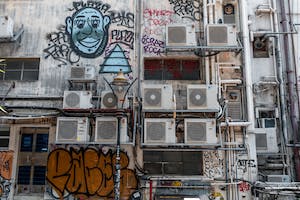How Air Conditioning Works
by siteadmin

Air conditioning systems help to reduce heat inside your home and can also decrease the risk of heatstroke, dehydration, or other health complications.
An air conditioner operates by converting a refrigerant, from liquid to gas, and then pumping it outside through an compressor and evaporator coil.
Compressor
Your compressor is central to your air-conditioning system. It cools your system by moving refrigerant through your evaporator or condenser.
Compressors have a choice of motors: gasoline, electric or diesel. Gasoline models are often used for small home projects and shop projects. Diesel engines usually power larger outdoor units.
To create pressure, a piston in a cylinder of a refrigerator moves up or down, drawing warm refrigerant into the cylinder while its downstroke is reducing volume.
Some compressors operate on a one-stage cycle, while other use two. This allows for higher pressures to be generated than those that only have one stage. It also allows the air to be cooled before it enters the first cylinder.
It is essential that you keep your compressor in top condition. A dirty unit can reduce efficiency and even cause mechanical failure. To avoid such a situation, you should regularly inspect the coils and ductwork of your compressor for dirtiness. This will improve indoor air quality while saving money.
Condenser
Condensers convert high-pressure, refrigerant gas into liquid and then return it back to your system. This keeps your home cool.
The condenser is constructed of coils that are typically copper-based. These coils contain fans and metal blades to dissipate excess heat generated when the refrigerant passes through.
Once refrigerant enters the compressor and has passed through coils, it is compressed more to convert it back into liquid. This is called desuperheating. During this process, multiple passes are made through the compressor to help cool down the refrigerant until it reaches saturation temperature.
If your condenser displays signs of malfunction or damage, you should immediately have a technician assess and inspect it. A quick response could save you money, and prevent the unit shutting down.
Evaporator
Modern air conditioners rely heavily on the evaporator. These two parts work in tandem to remove heat and carry it out of your home.
The evaporator coils of your air conditioning system are made out of copper tubing. Copper tubing conducts heat very efficiently. They're close to the blower for efficient performance.
As warm ambient air passes over the evaporator coils, the refrigerant absorbs this heat, changing its liquid form into vapor. This dissipates heat back to the surrounding atmosphere, cooling it.
If you refrigerant isn't absorbing enough heat then it won't be converted into vapor. Therefore, your air conditioning system won't function as designed. In addition, pinholes can form. Your evaporator needs to be free of dust and debris for optimal functioning.
Ductwork
The ductwork in air conditioning systems is an essential component. Without it your home will be cooler than necessary, and the conditioned HVAC units air may not reach its destination.
There are a variety of ductwork types that you can integrate into your HVAC systems, each with distinct advantages.
Flexible ductwork is often less expensive and easier than rigid ducts to install. However the kinks and bends in flexible ducts can reduce airflow and reduce efficiency.
Rigid Ductwork is more durable, resistant to higher temperatures, and can be constructed of different materials.
Ductwork connects directly with HVAC systems' supply plenums and return plenums. This is where air conditioned or warmed air that passes ductwork before being released to its final destination.
https://www.hvacbountifulut.com/
affordable hvac contractors bountiful
Air conditioning systems help to reduce heat inside your home and can also decrease the risk of heatstroke, dehydration, or other health complications. An air conditioner operates by converting a refrigerant, from liquid to gas, and then pumping it outside through an compressor and evaporator coil. Compressor Your compressor is central to your air-conditioning system.…
Recent Posts
- Condon Total Comfort, Inc. Offers Top-notch HVAC Services
- Clearing the Air: Duct Cleaning Alexandria Debunks Common Myths Surrounding Air Duct Cleaning
- Clearing the Dust: Duct Cleaning Louisville KY Shares Tips to Make Your Home Less Dusty
- Exploring the Drawbacks of Duct Cleaning: Insights from Air Vent Cleaning Charlotte
- Grand Prairie HVAC Service: Your Trusted HVAC Company in Texas
